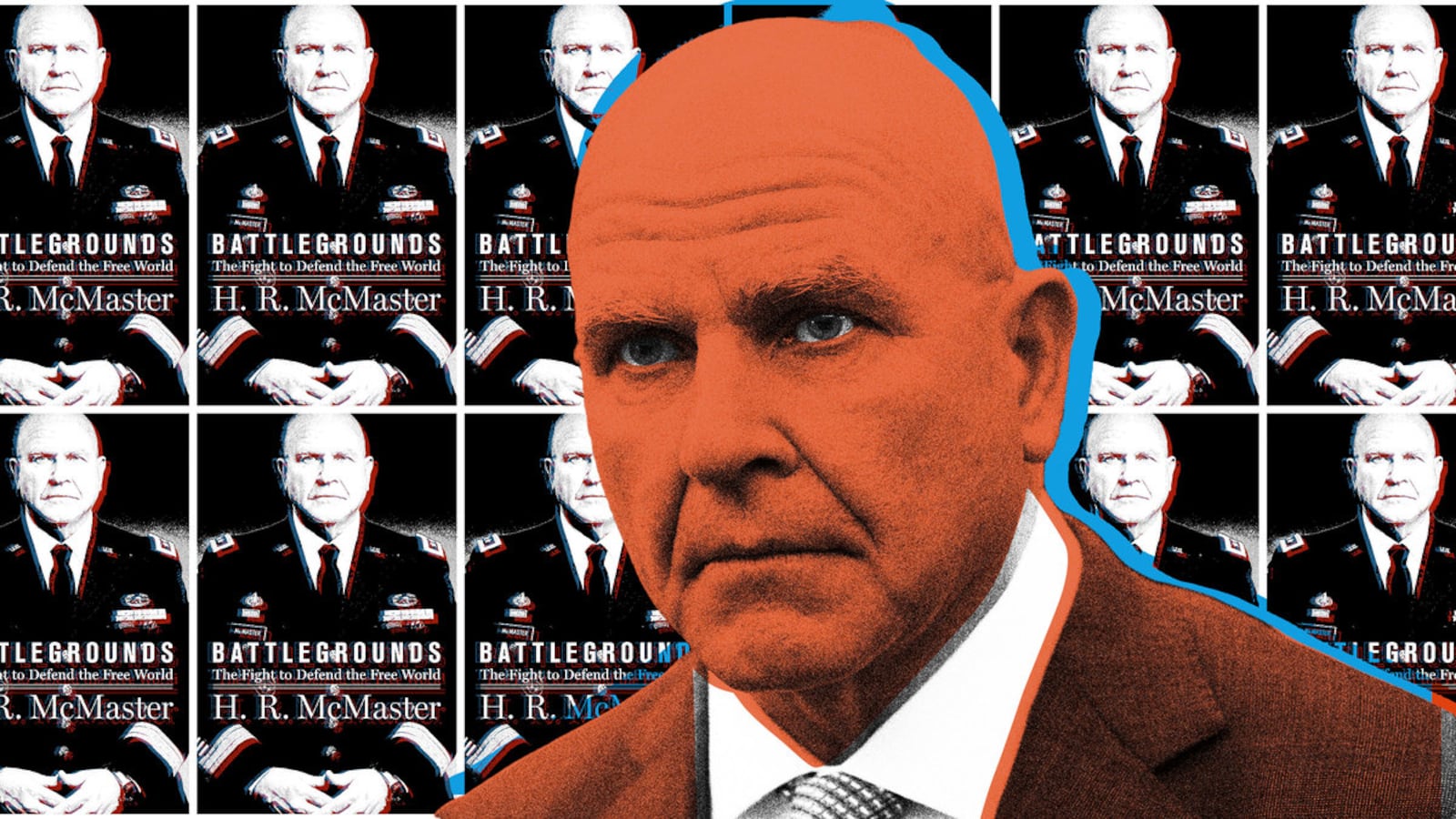In June, a host of prominent military officers voiced their opposition to President Trump’s threat to order U.S. soldiers to confront anti-racism protesters. Jim Mattis pronounced Trump, whom he had served as defense secretary, a threat to the Constitution. Joining Mattis were generals and admirals notable from the endless post-9/11 wars: Tony Thomas, John Allen, Mike Mullen, several others. Notably absent was H.R. McMaster, the retired Army three-star general who spent an uncomfortable year as Trump’s national security adviser.
At the time, a disappointed former McMaster aide speculated to The Daily Beast that McMaster might be holding his fire for a forthcoming book. But that book, Battlegrounds, continues McMaster’s silence on Trump’s fitness for office. “This is not the book that most people wanted me to write” is its first sentence, aptly matching the disappointment that McMaster’s White House tenure inspired even among his friends.
It’s not just that McMaster’s disinterested in a tell-all. Battlegrounds, obtained early by The Daily Beast, is disinterested in shedding any significant light on the Trump administration. Readers will learn more about what McMaster said to former Iraqi Prime Minister Haydar Abadi or South Korean Ambassador Chung Eui-yong than any conversation he had with the president. McMaster wants instead to deliver a lecture about American strategy, primarily concerning Russia, China, North Korea and Iran. And there McMaster’s evasions are significant.
The geopolitical perspective McMaster offers in Battlegrounds, in keeping with his year as national security adviser, pretends that Trump hasn’t happened. When it intersects with Trump at all, it’s to use Trump’s momentary assent to one or other McMaster initiative as a sign of the general’s wisdom or potency. McMaster wants a foreign policy for the America he believes he was promised, not the one that elected Trump and is currently steeling itself for election-related violence.
Battlegrounds seethes with understandable frustration over how foolishly America utilized its 30 years of unchallenged global domination. But since McMaster can’t give up on the idea of America as the dominant force in the world, he can’t reckon with how bellicose proposals like the ones he offers wrecked America and helped produce Trump. In that, McMaster exemplifies a certain elite evasion, one particularly noticeable in military circles, of the origins, meanings and legacies of the Trump presidency. It is likely to accelerate if Trump wins reelection, and unlikely to abate if Trump loses, much as the enormity of George W. Bush’s presidency has faded from elite memory.
If Battlegrounds readers learn anything about the Trump administration, it’s that McMaster was a more hawkish force than he appeared. While he tried to save the Iran nuclear deal, McMaster writes that among its “fundamental flaws” is that the Iranian regime is “fundamentally untrustworthy and hostile to the United States,” implying that no deal is truly possible, even though Iran complied. He similarly denigrates negotiating an end to the Afghanistan war with the Taliban, whom McMaster writes are inseparable from al-Qaeda: to McMaster, “Afghanistan was a modern-day frontier between civilization and barbarism.” It turns out an architect of “Maximum Pressure” on North Korea believes that America might convey that while it doesn’t seek to destroy the Pyongyang regime, “that goal could change if Kim refuses to denuclearize.” McMaster’s willingness to threaten regime change on a nuclear power comes 15 pages after he wonders, “what was North Korea so eager to deter?”
It’s not that McMaster approves of Trump. Out of office, he grits his teeth through Trump negotiating with the Taliban, threatening pullouts from Syria and undermining Maximum Pressure by meeting with Kim Jong-un in Singapore. After Iran shot down a U.S. drone in summer 2019, McMaster writes that Trump’s “lack of a response emboldened Iranian leaders.” But Trump is mostly absent, even as Trump junks most of McMaster’s initiatives.
When he’s present, McMaster either misreads Trump or normalizes him. He laments how Trump “appeared to waver in his determination to hold Russia accountable,” as if that was ever Trump’s priority. Trump’s “over-optimism” merely “fit a pattern of optimism bias and wishful thinking across two previous administrations.” George W. Bush and Barack Obama may have approached Vladimir Putin naively, but they did not actively solicit foreign assistance against their political opponents. After Saudi Crown Prince Mohamed bin Salman had journalist Jamal Khashoggi dismembered, McMaster laments that Trump “failed to condemn MBS or impose any meaningful costs on the Saudi regime.” But it wasn’t a failure; it was a policy.
Either variety of evasion regarding Trump matches McMaster’s inability or unwillingness to face what Trump’s rise says about America at this moment in history. Within months of becoming national security adviser, McMaster was besieged by a smear campaign borne over the hashtag #firemcmaster. He cites an Atlantic Council analysis to characterize #firemcmaster as a “collaborat[ion]” between Russia and the alt-right. But the analysis characterizes #firemcmaster primarily as something Americans did on their own. It is not only liberals who find Russian subversion of America an easier explanation to bear for the current crises than the existence of authentic American fascists.
Rendering this normalization ironic is McMaster’s repeated exhortations for America to view the world as it is—to him, an “arena” of competition—rather than how Americans would like it to be. Yet the country he advises bears little resemblance to the America of 2020. He repeatedly speaks of America’s defense of a “rules-based order” promoting political and economic liberty as its primary selling point to the world. Yet it was America, not Iran, that violated the terms of a multilateral nuclear accord. It was America that declared the world its global battlefield after 9/11, reserved for itself the right to extend a dragnet over the world’s communications, and invaded a country that did not threaten it. The war on terror that McMaster simultaneously criticizes and seeks to extend either unraveled that international order or revealed it as a pretext for American dominance. Putin cited “the actions of the United States in Afghanistan, Iraq and Libya” when invading Ukraine. North Korea took notice of Obama helping overthrow Moammar Gadhafi after Gahdafi gave up his nuclear program. McMaster rightfully decries China’s “systematic repression” of its Uighur Muslim minority without acknowledging the leaked Communist Party documents that show Beijing viewed America’s the war on terror as the model for its tyranny.
McMaster “distinguish[es] our free and open societies from the closed, authoritarian system China was promoting,” and the distinctions matter. But so does the fact that what America did during its moment of dominance made it far less free and open, and discredited its supposed model both externally and domestically. Endless war, a term McMaster hates, unleashed nationalist passions, first against Muslims and immigrants, that blended with extant nationalist resentments against Black people, all in an atmosphere of wartime emergency. On Thursday, Republicans on the House Homeland Security Committee pressured the FBI director to treat antifascist demonstrators as a terrorist organization. Promoting wars that could neither be won nor abandoned left advocates like McMaster vulnerable to Trump’s argument that he ought to replace them as a font of authority. The Founders literally warned about this. James Madison, in 1795, wrote of the “degeneracy of manners and of morals,” as well as the “opportunities of fraud,” emerging from war as a way of life. “No nation could preserve its freedom in the midst of continual warfare.”
McMaster has no patience for any of these critiques. He has no shortage of criticism of the war on terror. But McMaster seems to think the damage it did is ephemeral, something America can shunt aside in favor of “competing” with other great powers. He uses the term “strategic narcissism” to deride any suggestion that America prompted or exacerbated any of the global challenges it seeks to confront, even as the evidence accumulates around him. McMaster is so hostile to “blowback” explanations that he digresses into irritation that Iranians and even westerners see the CIA-engineered 1953 coup against Prime Minister Mohamed Mossadegh as a big deal. This is American Exceptionalism as the geopolitical version of white innocence. It helps him dismiss anyone “ideologically predisposed toward disengagement from ‘forever wars.” He believes them not to have a point about the circumstances of the world but instead a lack of “confidence” in America.
McMaster’s evasions come as others speak out. Earlier this week, Olivia Troye, a security adviser to Vice President Mike Pence, spoke out against Trump’s “disregard for human life.” McMaster’s book has the chutzpah to hail immigrants “one of America’s great competitive advantages” while ICE whistleblower Dawn Wooten presented an account of the forced sterilization of migrant women. As an Army major, McMaster wrote a scathing book, Dereliction of Duty, that appropriately called out the Vietnam-era Joint Chiefs of Staff, who were complicit in a disaster, through their silence. It might be in need of a new foreword.








